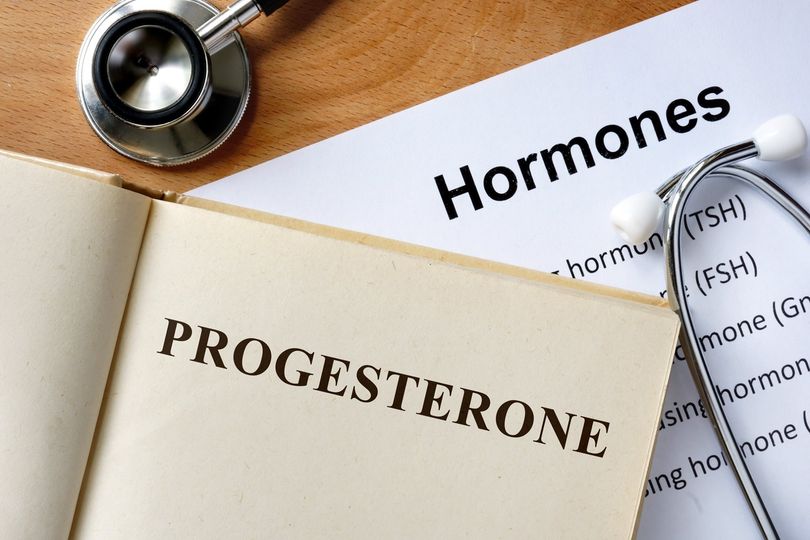

You’ve probably heard about Hashimoto’s disease or possibly been diagnosed with it. Hashimoto’s disease, or autoimmune thyroiditis, is the most common autoimmune disease. It causes an underactive thyroid, or hypothyroidism, and is most commonly diagnosed in women.
A key to treating symptoms of Hashimoto’s disease is understanding the relationship between hormone levels and the thyroid. The hormone progesterone, in particular, plays a significant role in thyroid function, and low levels can lead to thyroiditis.
Read on to learn more about the role of progesterone in Hashimoto’s thyroiditis.
What is Progesterone
Progesterone is a hormone that plays a significant role in the reproductive system, including support for menstruation and pregnancy. More specifically, progesterone prepares the lining of the uterus where a fertilized egg will grow. If fertilization does not occur, the lining sheds during menstruation. But if conception does occur, progesterone levels increase to help support the pregnancy.
Other functions of progesterone are:
- Mood regulation
- Supporting thyroid function
- Supporting lactation
- Weight management
- Regulating blood pressure
- Protecting bone health
- Reducing hot flashes
- Induces sleep
Progesterone levels also help balance estrogen, another hormone strongly connected to thyroid function.
Symptoms of Low Progesterone
- Breast Tenderness
- Early miscarriage
- Irregular periods
- Insomnia
- Ovarian Cysts
- Lower body temperature
- Mood Swings
- Anxiety and Irritability
- Infertility
- Carbohydrate cravings
- Water retention
- Hypothyroidism
The Relationship Between Progesterone and the Thyroid
The relationship between progesterone and the thyroid is symbiotic. While low progesterone levels affect the thyroid function, the function of the small, butterfly-shaped gland in your neck also affects your progesterone levels. When their relationship falls out of balance, it can negatively affect your overall health.
Progesterone deficiency makes it hard for the hormone to bind to progesterone receptors located in the thyroid, which the gland uses to produce T3 and T4. That means a decrease in thyroid hormone production and estrogen dominance.
Progesterone Deficiency and Estrogen Dominance
The balance of progesterone and estrogen is essential for your health. When progesterone levels are low, it can cause estrogen dominance. If you have estrogen dominance, your liver will produce higher thyroid-binding globulin (TBG) levels, decreasing the amount of thyroid hormone produced.
This is what leads to hypothyroidism, or Hashimoto’s thyroiditis.
Progesterone and Hashimoto’s Thyroiditis
Autoimmune thyroiditis happens when your immune system sees the thyroid as a threat and begins to attack it. Two autoimmune thyroid diseases have been identified: Graves’ disease, which causes hyperthyroidism, and Hashimoto’s disease, which causes hypothyroidism.
The rate of Hashimoto’s thyroiditis is increasing each year, largely affecting women more than men. One study published by Endocrine Research also showed a relationship between women with polycystic ovary syndrome (PCOS) and Hashimoto’s.
Common symptoms and side effects of autoimmune thyroiditis include:
- Decreased libido Depression and anxiety Fatigue
- Hair loss
- Headache
- Lack of interest in activities
- Weight gain
Progesterone is Anti-Inflammatory
One aspect of Hashimoto’s disease is inflammation. Thyroiditis specifically refers to inflammation of the thyroid, and hypothyroidism aggravates this inflammation through oxidative stress. The cycle of oxidative stress and inflammation means less hormone production.
Thankfully, progesterone is anti-inflammatory. So by treating your progesterone levels, you can decrease inflammation and reduce your thyroiditis symptoms.
Checking Progesterone Levels with Hormone Testing
Because progesterone levels play an essential role in your health, it’s vital to get your hormone levels tested, especially if you are experiencing any of the symptoms commonly associated with low progesterone levels or have been diagnosed with Hashimoto’s disease.
And while it’s true that women are affected in more significant numbers than men, men need to get tested, too.
But hormone testing is just one part of developing the right treatment plan.
At Rejuvenate Hormone and Weight Loss, we specialize in thyroid care and help patients find the root cause of their health issues – and we don’t believe in a one-size-fits-all approach to treating thyroid and hormone imbalance. Instead, we take the time to understand your symptoms and medical history and work with you to create a personalized treatment plan specific to your healthcare needs. Our thyroid care specialists are experts at helping you achieve optimal thyroid and hormone health.
Cutting Edge Hormone Optimization Treatments
Should balancing your hormones be a part of your healthcare routine? Take our online quiz to find out!
Our concierge practice is a safe, supportive place you can call home and receive real-time expert support—in person or virtually—for all of your health goals and challenges. Contact us today for a consultation where our team of providers will formulate an individualized treatment plan to help you feel and look your best—from the inside out. Feeling like yourself again and living your best life starts here and now.
Book a consultation today to get started!
The information provided is for informational or educational purposes only and does not substitute professional medical advice or consultations. Please work with a qualified healthcare provider before starting any new supplements.


